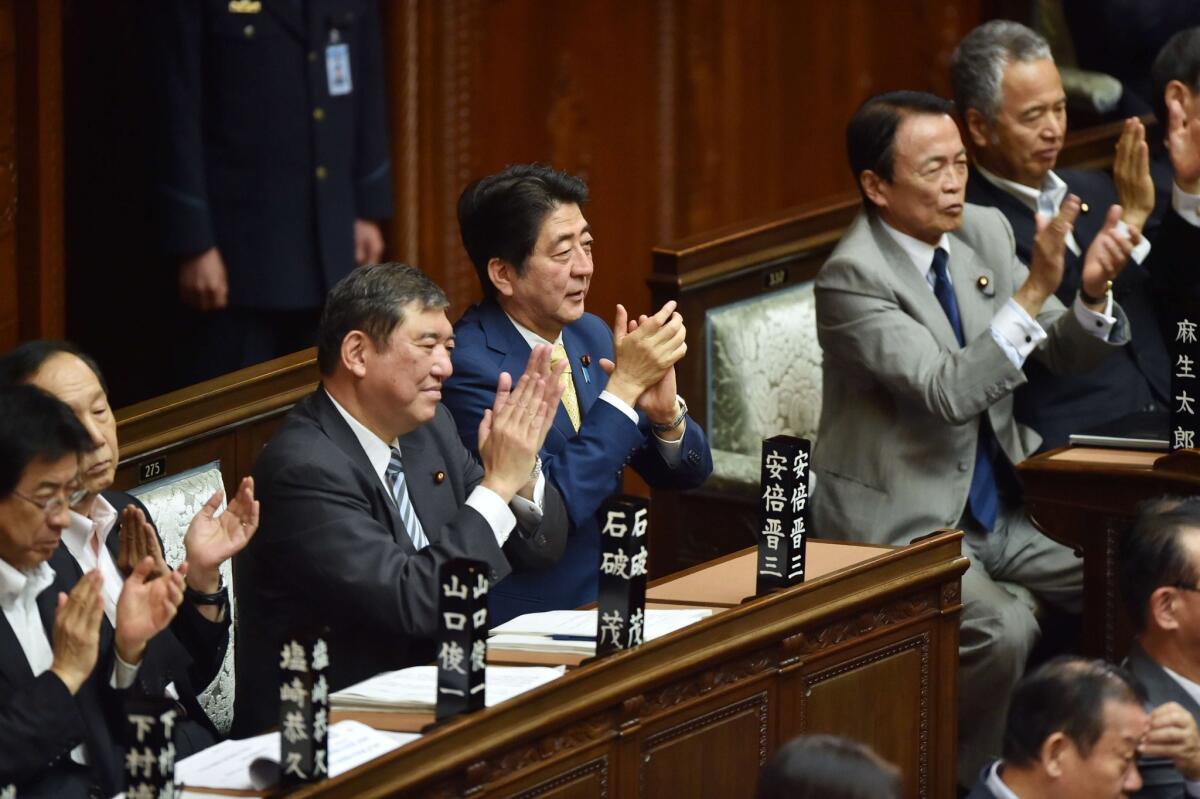Japan moves toward sending soldiers to fight abroad for first time since WWII

Japan’s Prime Minister Shinzo Abe, center, with members of his Cabinet at a lower house plenary session July 16 at parliament in Tokyo. Security bills were approved to expand the nation’s military role.
- Share via
Reporting from Tokyo — Controversial legislation that could result in Japanese troops fighting abroad for the first time since World War II passed the lower house of Japan’s parliament on Thursday after large public protests and scuffles in the normally staid chamber.
The bills have been championed by Prime Minister Shinzo Abe, who contends that Japan – which adopted a U.S.-drafted pacifist constitution after its defeat in World War II – needs to be able to come to the aid of allies, particularly America, under the doctrine of “collective self-defense.”
His push comes as China is expanding its military capabilities and increasingly asserting itself in the South China Sea and East China Sea.
But polls show a majority of the Japanese public opposed to the effort, and legal scholars have objected to the legislation as unconstitutional.
On Thursday, Abe’s ruling coalition was left alone to vote on the bills after the main opposition parties walked out of the lower chamber in protest.
On Wednesday, an estimated 60,000 opponents of the legislation rallied outside the parliament building after the bills were pushed through a key panel of the lower house on their way to approval by the full body, with participants shouting “Stop it, Abe!” and “We need to protect our kids!”
“This legislation is absolutely necessary to protect the Japanese people and prevent war,” Abe told reporters after Thursday’s passage. He added he would “strive to deepen public understanding” of the bills.
The bill still requires agreement from the upper house, where Abe’s coalition also has a majority. But experts said the coalition decided to push the bill through now to take advantage of what’s known as “the 60-day rule” in the current parliamentary session, which has been specially extended.
Under that rule, if the upper house fails to vote on a bill within 60 days of its passage in the lower chamber, it can be sent back to the lower house and enacted there if more than two-thirds of attending members of the lower chamber agree.
The ruling bloc currently controls more than two-thirds of the lower house.
“The opposition could still possibly stop the bills. However, the government can still override a veto with its crushing majority in the lower house,” said Koichi Nakano, a professor of Japanese politics at of Sophia University. Still, he said, that would “likely be a very unpopular move — as opposition rises — and therefore a scenario that the government would rather avoid.”
The public broadcaster, NHK, did not air the committee deliberations or report extensively on the protests. The broadcaster was so swamped with complaints that it had failed to serve the public interest that the phone lines were temporarily down, according to some local media reports.
The unusually tense committee vote on Wednesday was an indication of how strong feelings are about the legislation. Opposition members shouted angrily as the ruling coalition moved the security bills through the panel in a session marked by pushing and shoving. Some opposition members held placards with slogans such as “We Cannot Forgive the Abe Regime.”
Opposition members rose from their chairs and surrounded committee Chairman Yasukazu Hamada of Abe’s Liberal Democratic Party and tried to halt the voting procedure. Hamada yelled back at them like a pro wrestler chewing out an opponent.
Amid the uproar, some lawmakers stood up to show their support for the bill, and Hamada declared that the committee had passed it.
Thursday’s vote itself was also marked with jeers and yells, but much less ruckus.
The issue of reinterpreting the constitution has attracted attention from many quarters of society.
On Monday, Japanese film director Hayao Miyazaki, who won an Oscar for his animated movie “Spirited Away,” entered the fray, issuing heavy criticism of the bill at a news conference with foreign journalists.
Reflecting on Japan’s 15 years of war before its defeat and immense suffering that was caused, he defended the pacifist constitution as not something imposed on the nation by the United States but as “a ray of light.”
“Abe wants to be a great man who goes down in history for changing the interpretation of the constitution,” said Miyazaki. “That’s idiotic.”
Adelstein is a special correspondent. Times staff writer Julie Makinen in Beijing, and Louis Krauss and Reina Iino in Tokyo, contributed to this report.
More to Read
Sign up for Essential California
The most important California stories and recommendations in your inbox every morning.
You may occasionally receive promotional content from the Los Angeles Times.










